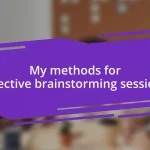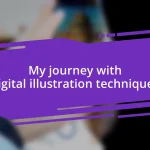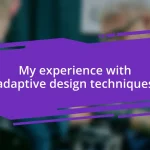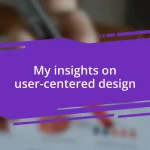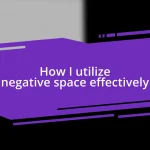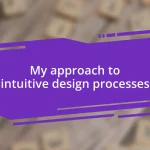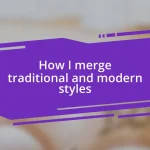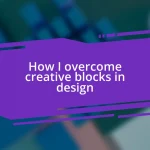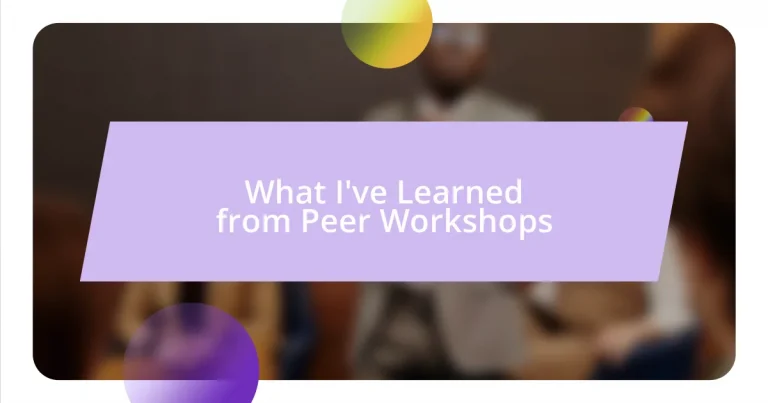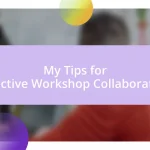Key takeaways:
- Peer workshops foster diverse perspectives, leading to innovative ideas and a strong sense of community among participants.
- Effective collaboration techniques, such as breakout groups and clear objectives, enhance engagement and streamline group discussions.
- Building lasting connections through peer workshops can lead to unexpected opportunities and a supportive network for future endeavors.
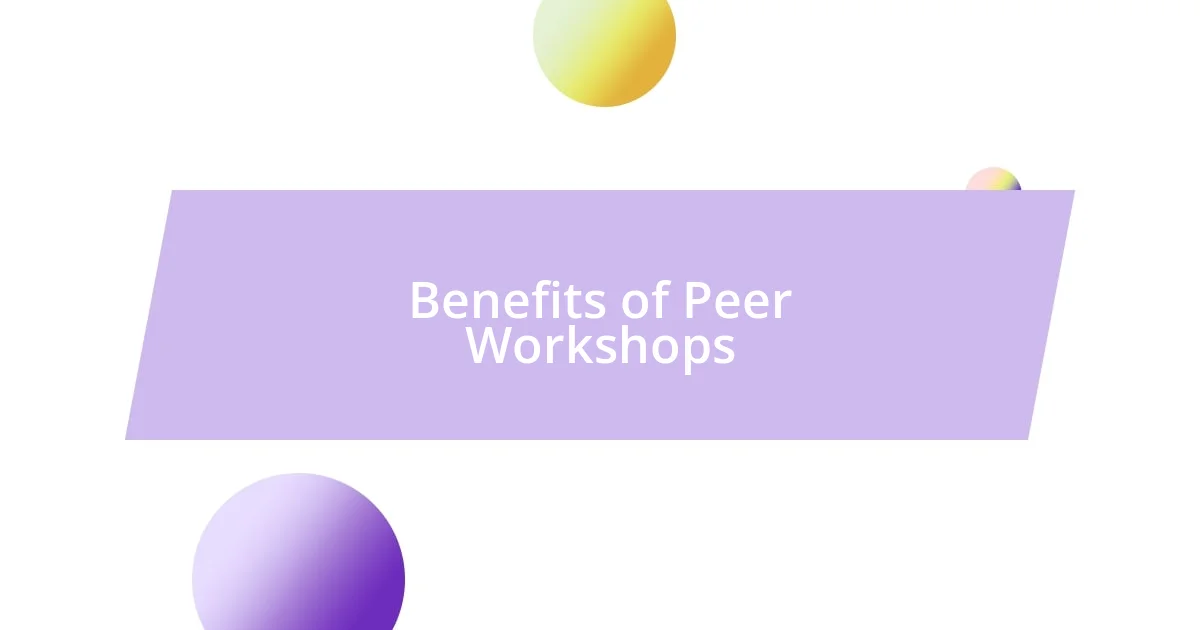
Benefits of Peer Workshops
One of the standout benefits I’ve experienced from peer workshops is the diversity of perspectives that come to the table. I vividly recall a workshop where we tackled a challenging project; hearing different viewpoints not only challenged my assumptions but also sparked innovative ideas I never would have considered. Have you ever been in a situation where a simple suggestion led to a major breakthrough? That’s the power of collaboration at work.
Another advantage is the sense of community that forms among participants. In one particular workshop, I felt a genuine connection with my peers as we navigated our struggles together. Sharing our vulnerabilities made the experience feel safe and supportive, almost like having a cheerleading squad that truly understands what you’re facing. Doesn’t that kind of camaraderie enrich the learning experience?
Lastly, peer workshops foster accountability and motivation. I’ve found that having someone else to share my goals with creates a subtle yet significant push to stay on track. When I committed to a project in a workshop, I felt an increased drive to follow through because I wanted to share my progress with others. Isn’t it fascinating how commitment shared among peers can elevate our determination?
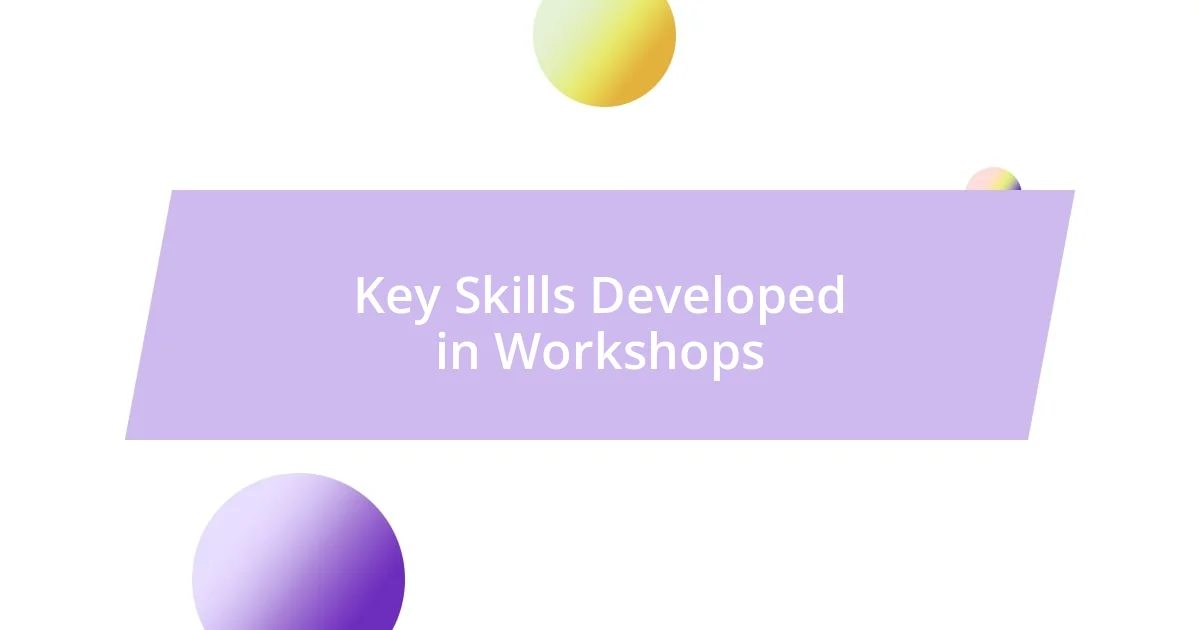
Key Skills Developed in Workshops
In the realm of peer workshops, I’ve noticed a remarkable development in my communication skills. As we brainstormed together, I learned how to express my thoughts clearly and concisely while also listening actively to others’ ideas. There’s something truly enlightening about articulating your perspective and seeing how others build on it. It’s like a dance, each move supporting the next, ultimately creating a harmonious outcome.
- Enhanced verbal communication
- Active listening and empathy
- Confidence in sharing ideas
- Constructive feedback deployment
- Team collaboration
Moreover, I’ve gained significant critical thinking abilities during these workshops. I remember a discussion that started with a simple question, which evolved into a deep dive into complex problems and creative solutions. These moments pushed me to evaluate multiple viewpoints and assess information critically. It’s almost like polishing a diamond; with each workshop, my thought processes became sharper and more refined.
- Problem-solving skills
- Analytical reasoning
- Open-mindedness to alternative viewpoints
- Creative thinking
- Decision-making under pressure
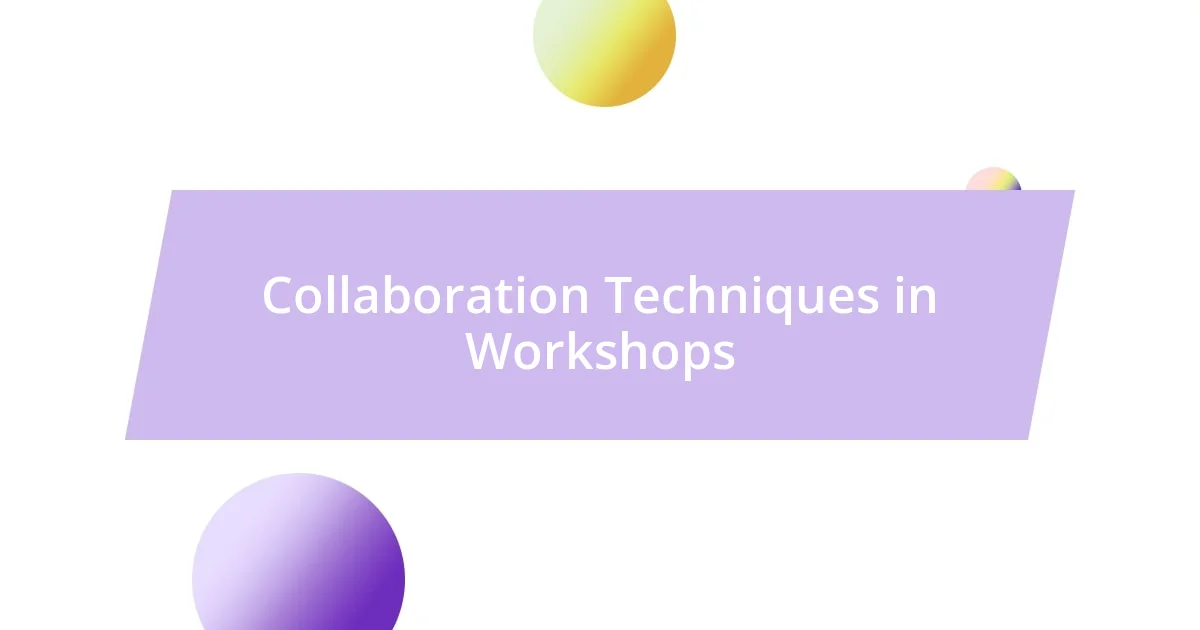
Collaboration Techniques in Workshops
Collaboration in workshops often hinges on the methods we use to engage with one another. For example, I’ve found that using breakout groups can be incredibly effective. During a workshop focused on developing a new marketing strategy, we split into smaller teams to brainstorm ideas. This not only made it easier for everyone to voice their opinions but also led to more targeted discussions that ultimately produced actionable strategies.
Another technique that I value is the use of collaborative tools, like virtual whiteboards. I remember a particularly exciting session where we leveraged a digital platform to visualize our ideas in real-time. It was exhilarating to see everyone’s thoughts morph and change as we worked collectively. These tools can help break down communication barriers, making it feel as if we’re all contributing to a living document.
Lastly, I cannot emphasize enough the importance of setting clear objectives before beginning group work. Reflecting on a recent workshop, I realized that when our group established structured goals, our collaboration felt more purposeful. Everyone knew what we were aiming for, which not only streamlined our discussions but also fostered a sense of shared responsibility. It’s impressive how a well-defined purpose can energize the team’s dynamics.
| Collaboration Technique | Description |
|---|---|
| Breakout Groups | Smaller teams encourage focused discussions and diversified input. |
| Collaborative Tools | Platforms like digital whiteboards enhance real-time idea sharing and visualization. |
| Clear Objectives | Establishing goals fosters purpose and shared responsibility in the group. |
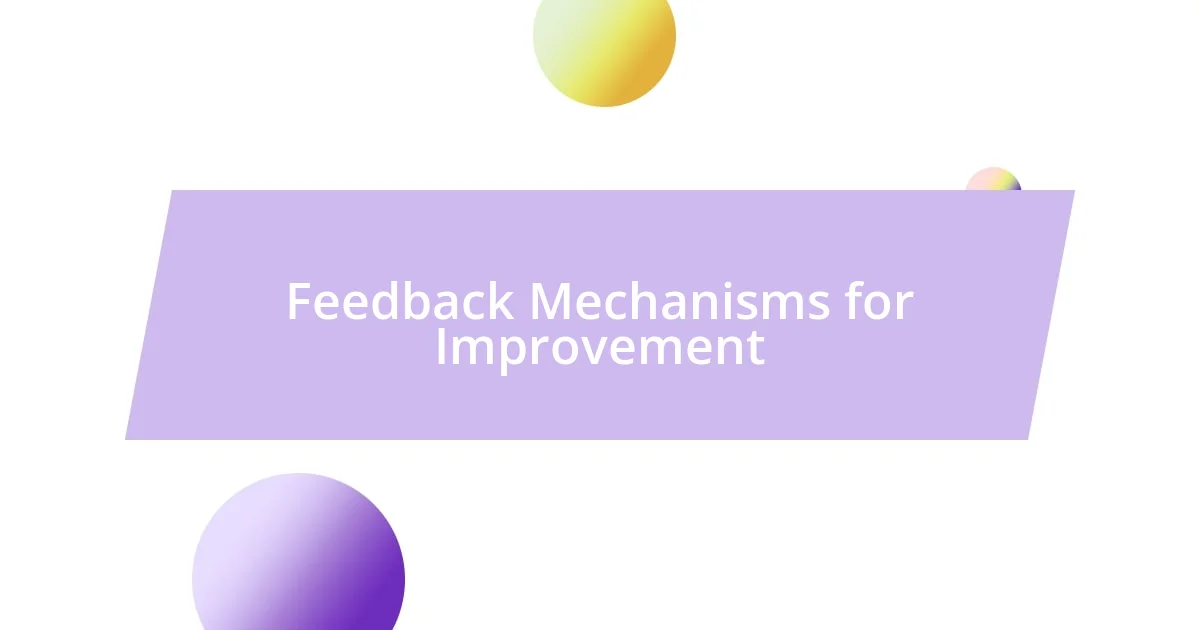
Feedback Mechanisms for Improvement
When it comes to feedback mechanisms, I’ve discovered that creating a safe space for honest conversation is crucial. In one workshop, I was caught off guard by how a gentle critique transformed my perspective on my project. It made me question, “What if I had never opened myself up to that feedback?” The realization hit me that constructive criticism isn’t an attack; it’s an opportunity for growth.
Another aspect I value in feedback is the practice of the “sandwich technique,” where positive remarks are placed around constructive criticism. I recall a moment when a peer complimented my ideas before suggesting improvements. This approach not only softened the blow but also made me more receptive to their suggestions. It’s fascinating how framing feedback can impact motivation and enhance engagement.
Lastly, I’ve found that soliciting specific feedback can yield rewarding insights. During a particularly challenging session, I asked for feedback on my presentation style. The responses varied, but they all highlighted areas for improvement that I hadn’t considered. It made me think, “What if I had continued without asking?” This proactive approach empowered me to fine-tune my skills, ultimately leading to a more impactful delivery.

Real World Applications of Insights
Real-world applications of the insights I’ve gained from peer workshops are profound and often surprisingly simple. For instance, after actively engaging in sharing insights, I was inspired to incorporate collective brainstorming sessions in my own workplace. This shift transformed our team’s dynamic from a monotone discussion to an energetic exchange of creative ideas. I often catch myself thinking, “What if everyone had the chance to voice their ideas as freely as I did in those workshops?” The impact is tangible; it fosters innovation and brings a unique vibrancy to our projects.
Another application I found valuable is the use of structured feedback loops that I experienced firsthand. In one of my workshops, the round-robin critiquing method allowed each participant to give and receive insights in a timely manner. I remember the rush of learning new perspectives on my work and how it quickly became part of my routine with regularly scheduled team check-ins. I often wonder how much richer our projects could be if we consistently used this feedback technique. The growth is exponential when everyone feels empowered to contribute meaningfully.
I also see the influence of collaborative tools in real-world scenarios. Having participated in workshops where we used virtual brainstorming platforms, I brought that experience back to my team. I can still recall the excitement of watching ideas take shape before my eyes. This movement towards tech-assisted collaboration reminded me that connecting virtually doesn’t diminish creativity; rather, it expands it. Have you ever considered how technology can amplify our collaborative efforts? In my experience, it not only enhances participation but also deepens our collective creativity, leading to outcomes that exceed expectations.
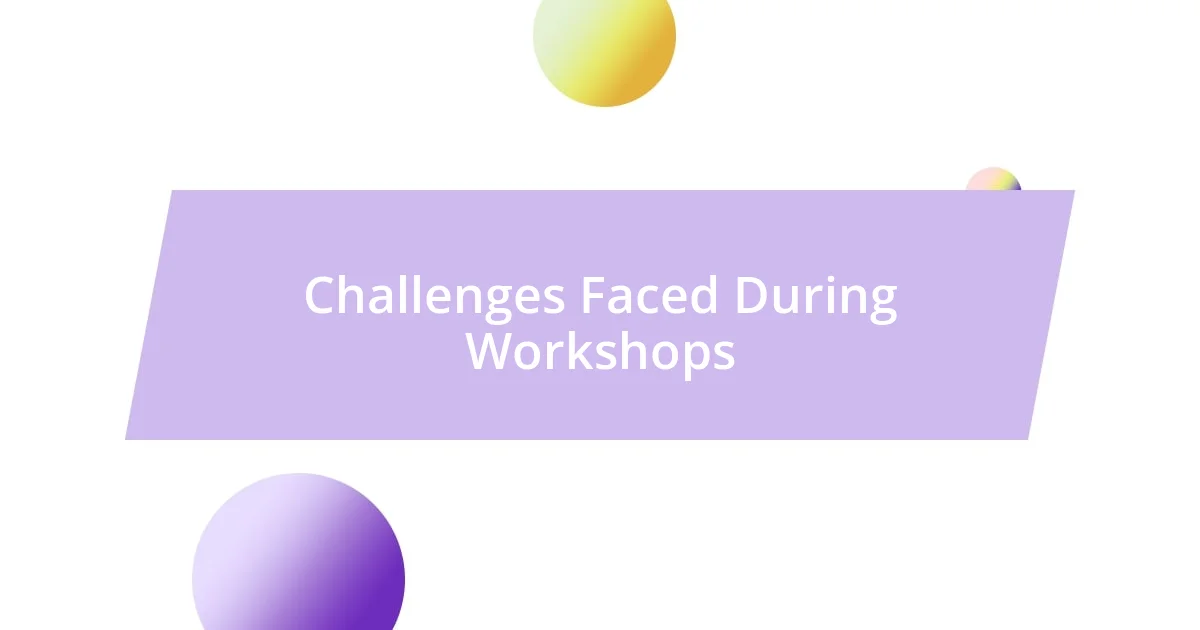
Challenges Faced During Workshops
Participating in peer workshops definitely comes with its own set of challenges. One that stands out for me was managing differing communication styles. I remember a particular session where one participant dominated the conversation, leaving little room for quieter voices. I felt the frustration build as I observed valuable perspectives going unheard. It made me wonder how to create a balance that encourages everyone to share without fear of interrupting.
Another challenge I’ve encountered is the clash of expectations regarding the workshop’s objectives. In one workshop, there were clearly defined goals, but the energy shifted when personal agendas took over. This left me feeling disoriented, as I wasn’t sure how to align my contributions with the group’s intent. Have you ever felt this disconnect? It took me a while to recognize the importance of clarifying goals at the start to ensure we’re all on the same page.
Technical difficulties can also throw a wrench into the flow of a workshop. I vividly recall a virtual session where the screen sharing kept glitching, and frustration rippled through the group. I remember feeling a mix of annoyance and empathy; we all just wanted to share our ideas smoothly! It prompted me to appreciate the value of small technical checks before a workshop. In reflecting on experiences like these, I’ve found that preparation is key to navigating the unpredictability of group dynamics.
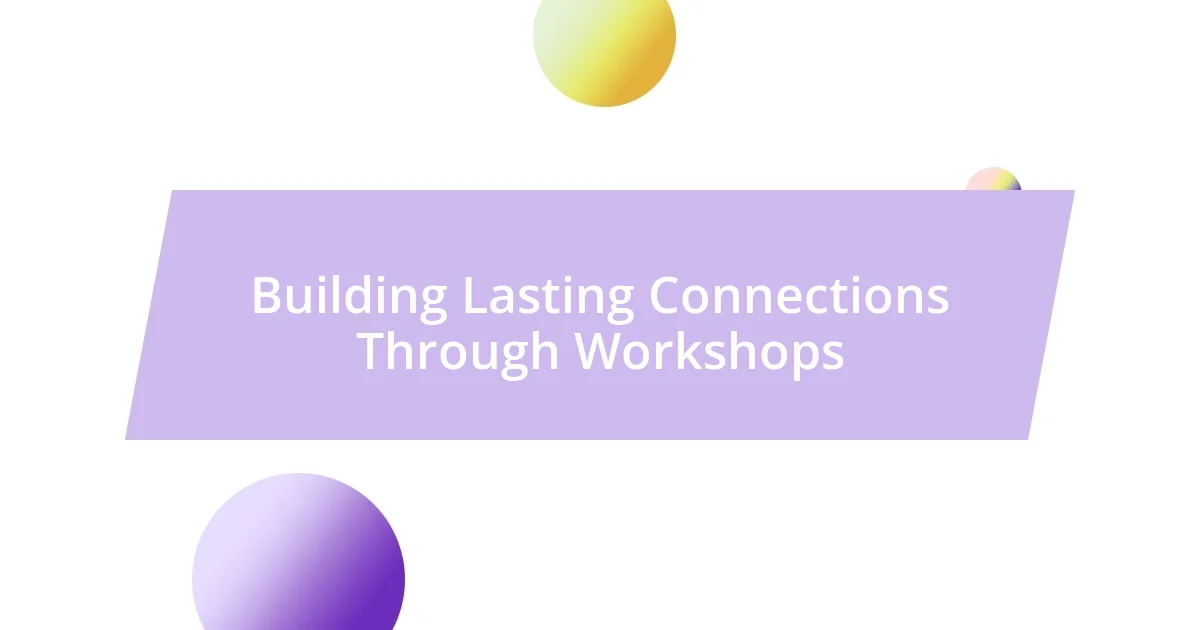
Building Lasting Connections Through Workshops
Connecting with peers in workshops has always felt transformative to me. I remember walking into my first workshop, unsure of what to expect. By the end, I left not just with knowledge, but with friendships that extended beyond the session. This experience made me realize that it’s not only about sharing ideas; it’s also about building relationships. Have you ever noticed how a shared mission can bring people together? Those connections become a support network, making future collaborations easier and more meaningful.
As I participated in various workshops, the emotional bonds I formed were unexpectedly strong. One time, during a particularly intense brainstorming session, we all shared not just our thoughts but our experiences. Hearing others’ stories created an atmosphere of trust and openness. I still cherish the connections with those individuals because we were willing to be vulnerable together. It reminded me that workshops can serve as a safe space; if everyone feels comfortable, the connections can develop into lasting friendships.
I’ve also found that connection often leads to unexpected opportunities. A few months after a workshop, I received a call from a fellow participant recommending me for a project. “I remembered how our perspectives complemented each other,” she said, which sparked my excitement. That moment illustrated the power of networking during workshops. Have you ever considered how one conversation can lead to new pathways? It’s these lasting connections that can propel us forward in our careers and personal journeys, ultimately enriching our lives in ways we never imagined.
